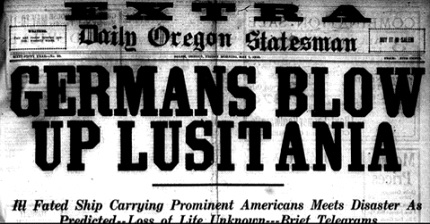by Richard van Pelt, WWI Correspondent
Across the front page of the Capital Journal was a single headline:
LINER LUSITANIA SUNK BY GERMAN SUBMARINE
1400 PASSENGERS TAKE TO SMALL BOATS WHEN HUGE LINER GOES DOWN
Liverpool, May 7. – The giant Cunard liner Lusitania with a heavy passenger list of American citizens was torpedoed and sunk off the Irish coast this afternoon. No loss of life is reported as yet. Small boats of every description were rushed from Queenstown to Old Head of Rinsale, off which point the big liner was torpedoed.
The Oregon Statesman was much bolder with one of the first large font banner headlines:
The sinking of the Lusitania will dominate the news in the coming months and contributed to a significant shift in American public opinion toward Germany.
On page 3, an article reported the sale of horses to the French government:
ANOTHER CARLOAD OF VALLEY HORSES OFF TO THE WAR
French Count and Government Contractor Inspect and Accept Shipment
Another carload of Willamette Valley horses has been purchased for service in the French cavalry and artillery and will be forwarded from this city within a few days by Rice & Wilson, contractors. This shipment of horses, which comprises some of the best stock in the country from Salem, Brownsville and Halsey, will join shipments from other sections of the country and assembled at some point on the Atlantic coast for over sea delivery to the French government. No news is given out as in the point of shipment, for fear of seizure by the enemy’s warships.
In connection with this shipment of horses it may also be said that Salem was yesterday visited by a genuine French noble in the person of Count de Fontenilly, of the French army, who, in company with Paul Klopstock, a French government contractor and a veterinary surgeon, inspected and accepted the animals.
The paper reported that cavalry horses were bringing $75 to $125 per head and good artillery horses $90 to $150.
The editorial page commented on the rôle of the United States as provisioner to the belligerent powers:
OUR SALES OF MUNITIONS
There is no wilder hallucination than that of the enormous increase in our export trade is largely in arms and munitions sold to belligerents.
It has been with food and clothing, raw material and finished products that we have come to build an export trade and score an international balance in our favor.
We have sold the belligerents aeroplanes and auto-trucks, motor-cycles and barbed wire, cartridges and gun-powder, firearms and explosives, in the six months from September to February, inclusive, to the value of less that $45,000,000. Horses, horse-shoes, rubber and wool manufactures have run our sales of all possible war materials, in the six months, up to a total of $92,400,000.
But see what we have done in sales of other things!
In March alone we sold abroad nearly $60,000,000 of breadstuffs and more than $28,000,000 of meat and dairy products. This is an increase of $51,600,000 in exports of breadstuffs over those of March last year, and an increase of $18,000,000 in meat and diary products.
In the nine months of the fiscal year from July 1 to March 31 resold abroad $418,000,000 of breadstuffs, more than $132,000,000 of meat and dairy products more than $297,000,000 of cotton.
Of breadstuffs, meat and diary products, cattle and hogs, cotton, cottonseed oil and mineral oils we sold abroad in the nine months $956,625,000.
In contrast to these stupendous figures, the $92,000,000 sales of munitions look small indeed.
Long after the war has closed the American people will be helping, as they are now, to feed and clothe the nations which have summoned bak their armies tiresome the creation of life and wealth after their destruction of them.








Leave A Comment